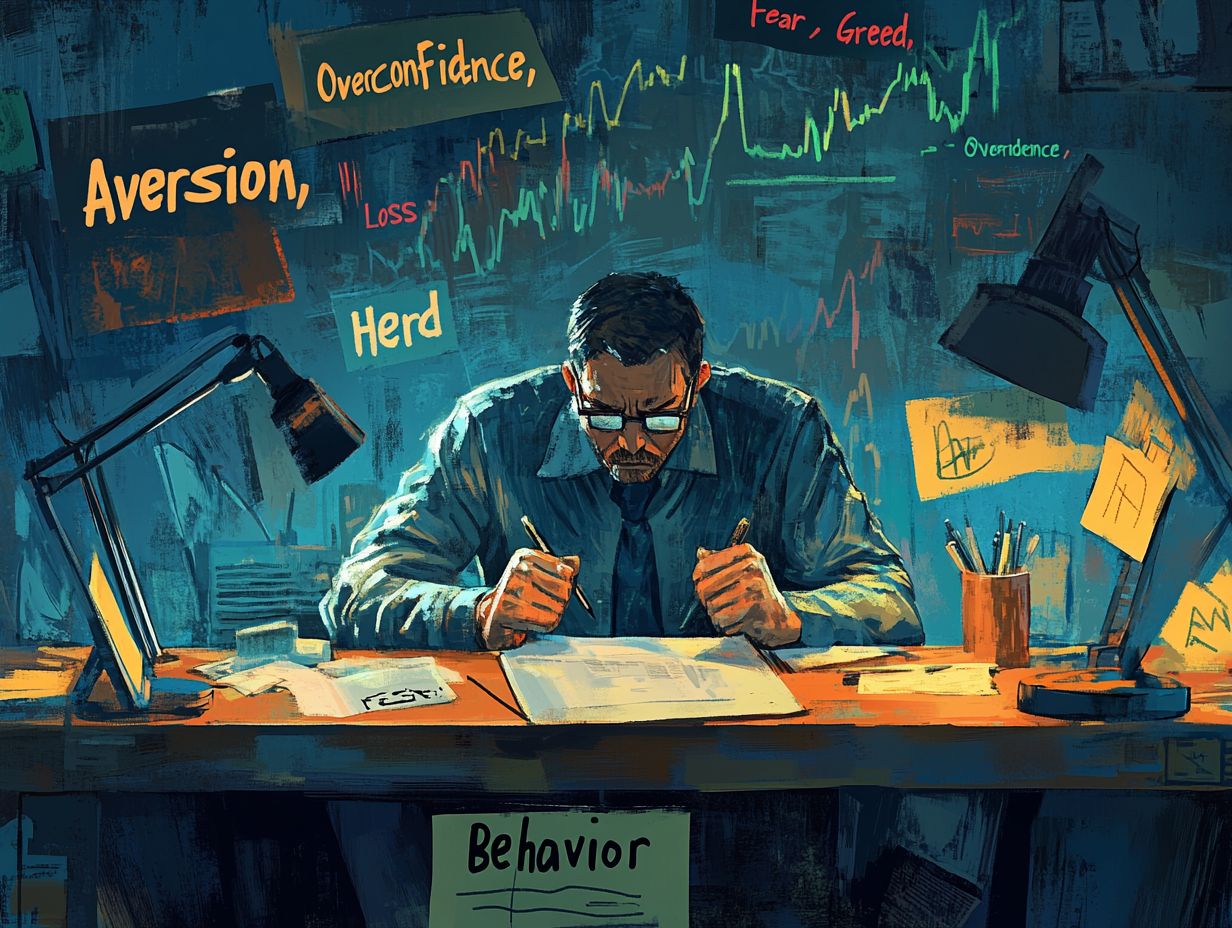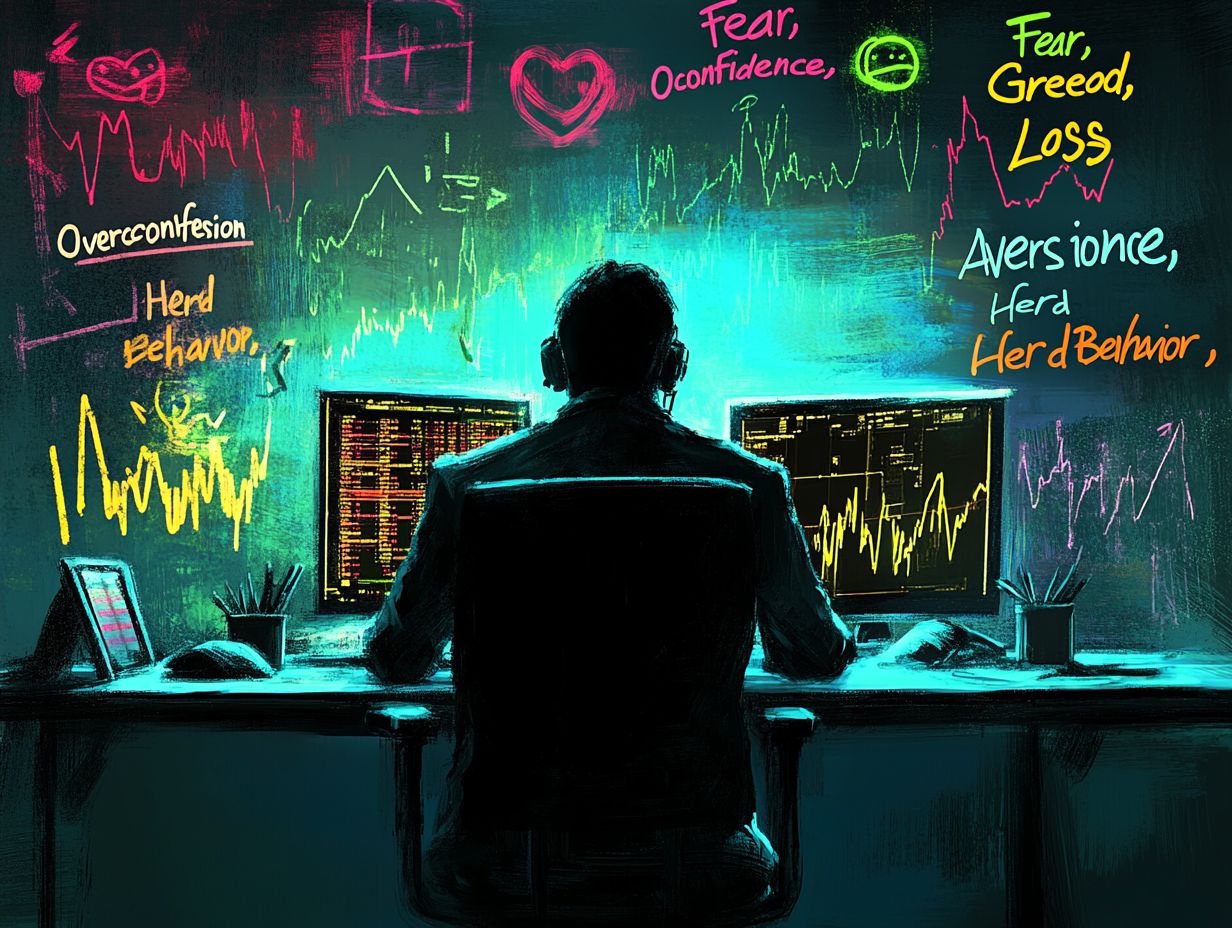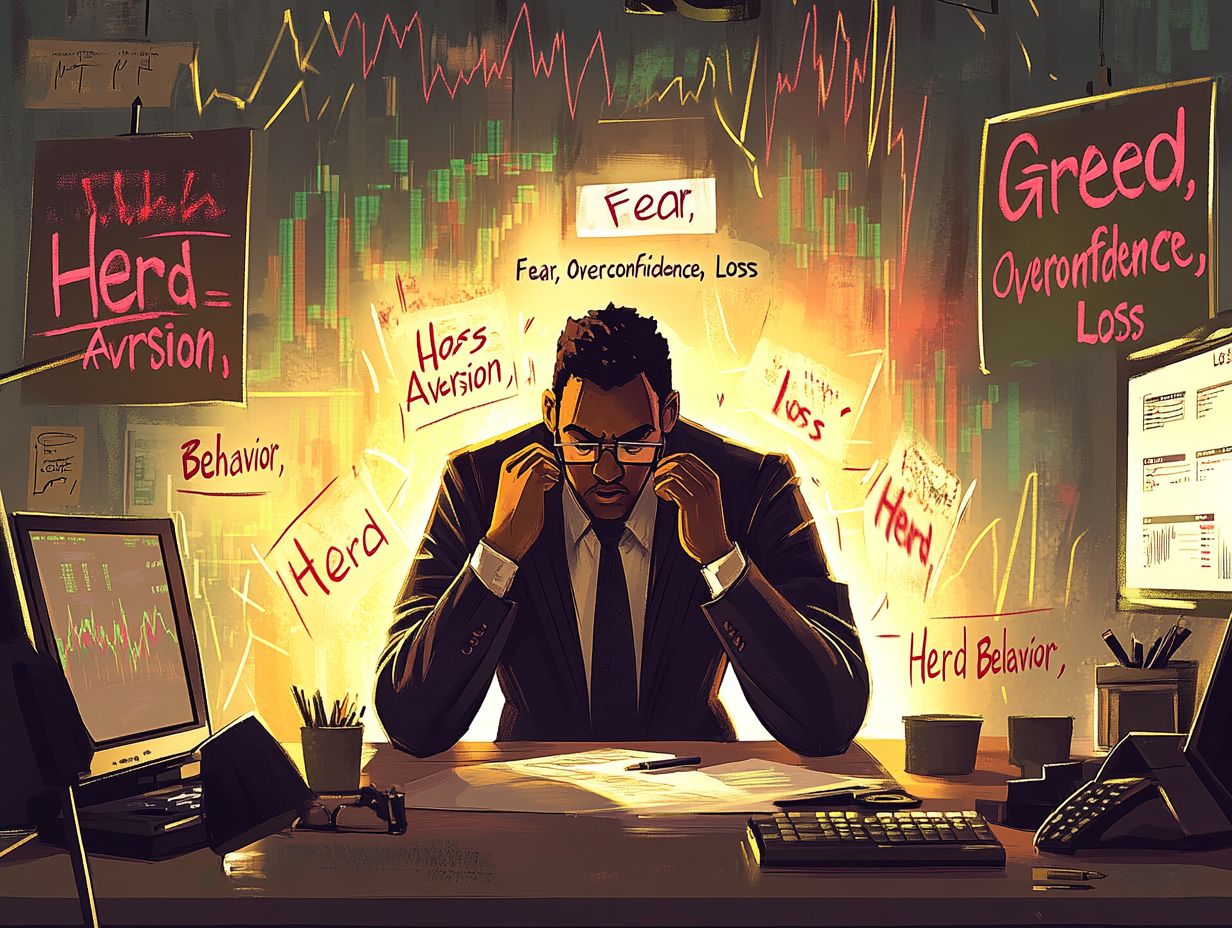Top 5 Psychological Traps in Trading
Trading can be an exhilarating yet perilous journey, where your decisions risk being swayed more by emotions than by cold, hard logic.
This exploration delves into the top five psychological traps that can derail even the most experienced traders: Confirmation Bias, Fear of Missing Out (FOMO), Overconfidence, Loss Aversion, and the Gambler s Fallacy.
Each of these pitfalls has the potential to significantly skew your trading decisions, leading to costly missteps.
You ll examine real-life examples, consider their consequences, and discover strategies designed to help you navigate these psychological hurdles.
Dive in as you uncover ways to enhance your trading mindset and refine your decision-making process.
Contents
Key Takeaways:

- Beware of these traps! Confirmation bias can blind you to other options, leading to poor decisions.
- FOMO drives you to make quick, illogical trades based on hype.
- Overconfidence can tempt you into risky trades and ignoring red flags.
1. Confirmation Bias
Confirmation bias is a common problem that can significantly sway your behavior as an investor. You often seek out information that reinforces your existing beliefs while conveniently overlooking any contradictory evidence.
This tendency can have a profound impact on your financial decisions within the intricate world of financial markets and trading strategies. Rooted in cognitive psychology, this mental shortcut shapes how you process information, often leading to less-than-ideal decision-making.
For instance, if you believe a particular stock is undervalued, you may focus solely on positive news articles, disregarding any negative reports. When this bias takes hold, it can instill a false sense of confidence in your positions, reminiscent of the dot-com bubble, where many ignored glaring warning signs in favor of overly optimistic projections.
The consequences of such behavior can be severe, resulting in substantial financial losses as you stubbornly cling to losing investments, convinced that your initial assessment was spot-on, even when market trends suggest otherwise.
2. Fear of Missing Out (FOMO)
Fear of Missing Out (FOMO) is a potent emotional trigger that can lead you to make hasty financial decisions based on fleeting market trends. This often results in unrealistic excitement and increased trading risks.
You might find yourself chasing trends that seem to be gaining traction or investing in assets simply because others are doing so. When you give in to FOMO, it’s easy to overlook the necessity of deeper analysis and lose sight of your investment strategies, which can lead to regrettable choices like jumping into positions at inflated prices.
Set clear and consistent goals to stay on track. Techniques like establishing trade limits, utilizing stop-loss orders (tools that automatically sell an asset when it drops to a certain price to limit losses), and conducting thorough research can be invaluable in mitigating the adverse effects of FOMO. This way, you can make more rational, informed decisions that align with your financial objectives.
3. Overconfidence
Overconfidence bias is a psychological trap that many investors fall into, leading them to overestimate their own knowledge and skills. This often results in risky trading decisions and suboptimal performance in the unpredictable world of financial markets.
This tendency can arise from various sources perhaps past successes, an over-reliance on personal intuition, or even the influence of peers who share an overly optimistic outlook. For example, you might recall a few profitable trades and mistakenly believe your strategy is infallible, while overlooking the inherent unpredictability of market conditions.
Real-life examples are plentiful: think of the day traders who ignore fundamental analysis or high-profile investors making rash commitments during bull markets. To sidestep these pitfalls, it s essential for you to regularly assess your assumptions and seek out diverse perspectives.
Implementing strict risk management strategies and establishing clear trading rules can greatly help mitigate the effects of overconfidence.
4. Loss Aversion

Loss aversion is a key psychological bias for investors. You likely feel losses more than gains, which can lead to poor decisions.
This emotional response may cause you to hold onto losing investments. You might fear accepting losses instead of seizing new opportunities.
To tackle these challenges, create a structured investment plan with clear buying and selling criteria. This helps reduce the impact of loss aversion.
Incorporating mindfulness techniques can also provide a clearer perspective. These methods help you make more rational choices.
5. Gambler’s Fallacy
The Gambler’s Fallacy misleads you into believing past events predict future outcomes. This can derail your investment strategies and increase your risks.
This thinking error occurs when you assume that a winning streak in stocks must lead to a drop. Such assumptions can lead to rash trading decisions.
Imagine watching a stock rise for several days. You might think a price drop is imminent and sell your shares too soon.
This quick reaction can cause you to miss out on potential profits. In a bull market, prices may keep rising despite your fears.
Recognizing this fallacy is essential. Instead of relying on perceived patterns, prioritize thorough research and data analysis.
By using structured decision-making processes and risk management techniques, you can reduce the likelihood of falling victim to these biases.
How Do These Psychological Traps Affect Trading Decisions?
Psychological traps like confirmation bias, FOMO (Fear of Missing Out), overconfidence, loss aversion, and the Gambler’s Fallacy can lead to poor trading decisions.
These biases can create a complex web that clouds judgment. For instance, confirmation bias leads you to seek information supporting your views while ignoring contrary data.
FOMO can drive impulsive trades based on hype rather than solid analysis. Recognizing how these traps affect your thinking fosters greater self-awareness.
This awareness helps you challenge irrational impulses. Ultimately, it enables you to make informed decisions for better trading outcomes.
What Are Some Real-Life Examples of These Traps in Trading?
Real-life examples of psychological traps in trading are everywhere. These examples showcase how biases like overconfidence, loss aversion, and confirmation bias can lead you to make significant mistakes, especially during market corrections and fluctuations.
Take, for instance, a trader who, riding high on a winning streak, felt invincible. They decided to double down on a sinking stock, convinced it would bounce back. This overconfidence resulted in substantial losses, illustrating how misjudging your own abilities can derail even the most experienced investors.
In another scenario, a trader faced with a declining asset succumbed to loss aversion. Rather than cutting their losses and selling, they clung to the stock, hoping it would recover. This decision not only hurt their portfolio but contributed to a broader market stagnation, as many investors found themselves paralyzed by the same fears.
These stories serve as cautionary tales, reminding you just how profoundly the human psyche can influence investment decisions.
What Are the Consequences of Falling into These Traps?

Falling into psychological traps can have serious repercussions for you as an investor. These can include poor trading results, misguided investments, and increased trading risks that can drastically impact your financial outcomes.
These biases often cloud your judgment. They lead to impulsive decisions that only deepen financial woes. Over time, this relentless cycle of loss can chip away at your confidence, making you reluctant to seize promising opportunities.
Ultimately, this can cause you to miss out on significant growth potential. The emotional toll of repeated setbacks can trigger anxiety and stress, distorting your future decisions. You may find yourself nudged toward overly conservative strategies.
This cautious approach can hinder your ability to fully engage in market recoveries. It showcases how psychological pitfalls jeopardize your financial success and take a toll on your overall mental well-being.
How Can Traders Overcome These Psychological Traps?
You can transform your trading experience by overcoming psychological traps. Start by honing your self-awareness and implementing clear steps for making decisions.
Recognizing the influence of emotions on your trading behavior is vital for achieving success in the market. By cultivating emotional intelligence the ability to understand and manage your own feelings and those of others you can identify your triggers and manage them effectively.
Techniques like maintaining a trading journal can be invaluable for reflecting on past decisions and understanding the emotional states that shaped those choices. By setting clear trading goals and sticking to a well-defined strategy, you can minimize impulsive behaviors.
This allows for more disciplined decision-making. Engaging in mindfulness practices can further enhance your focus and clarity, enabling you to navigate high-pressure scenarios with confidence.
What Are Some Strategies to Avoid These Traps?
To sidestep psychological traps, try adopting a mix of strategies. This includes maintaining a disciplined trading approach, implementing robust risk management practices, and regularly reviewing your investment thesis to stay in sync with market realities.
Cultivating a mindset centered on learning provides valuable insights that can significantly enhance your decision-making abilities. Engaging in consistent self-assessment, actively seeking feedback, and staying informed about market trends will help mitigate the emotional pitfalls of fear and greed.
Establishing a routine that prioritizes education whether through reading the latest literature, attending insightful webinars, or participating in trading communities provides a strong foundation for your trading journey.
Ultimately, emphasizing discipline and continuous improvement becomes a cornerstone for successful trading. This approach helps you remain steadfast and objective even amid volatility.
What Are the Long-Term Effects of Falling into These Traps?
Falling into psychological traps can have serious long-term effects. You may face chronic poor trading decisions and diminished confidence as an investor.
These mental pitfalls can lead you to internalize negative beliefs about your decision-making abilities. This erosion of confidence often creates a vicious cycle where fear and anxiety drive your investment choices.
Your financial health can take a significant hit, restricting growth potential and causing you to miss valuable opportunities. Take charge by cultivating resilience through a disciplined investment strategy.
Build a robust support system and enhance your self-awareness of behavioral triggers to succeed.
Frequently Asked Questions

What are the top 5 psychological traps in trading?
The top 5 psychological traps in trading are fear of missing out (FOMO), sunk cost fallacy, confirmation bias, overconfidence, and herd mentality.
How does fear of missing out affect trading?
Fear of missing out (FOMO) can lead traders to make impulsive and irrational decisions, such as buying into a rising market or selling during a market dip, in order to avoid missing out on potential profits.
What is the sunk cost fallacy and how does it impact trading?
The sunk cost fallacy is when traders hold onto losing investments, hoping to recoup their losses even when it goes against their better judgement. This can lead to further losses and keep traders from moving on to more profitable trades.
How does confirmation bias affect trading?
Confirmation bias is the tendency to seek out information that supports one’s existing beliefs and ignore information that contradicts them. In trading, this can lead to overlooking warning signs and taking on excessive risk, resulting in significant losses.
Can overconfidence be detrimental in trading?
Yes, overconfidence can be very detrimental in trading. Traders who are overconfident may take on too much risk, overestimate their abilities, and make impulsive, emotionally-driven decisions that can lead to losses.
What is herd mentality and how does it impact trading?
Herd mentality, also known as groupthink, is the tendency to follow the actions and decisions of the majority, even if they may not be rational or beneficial. In trading, this can lead to buying into a market at its peak or selling during a downturn, resulting in losses due to following the crowd rather than making informed decisions.
Take control of your trading strategy today by learning more about these psychological traps!






